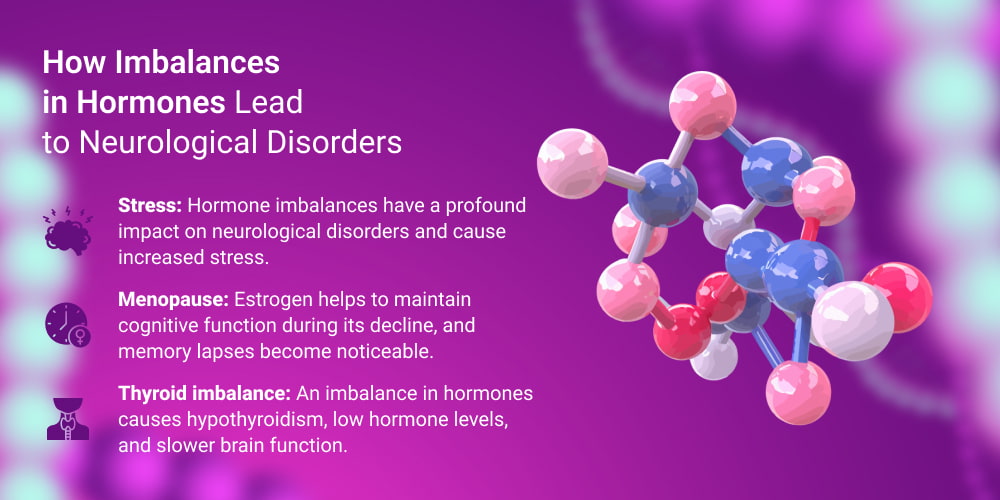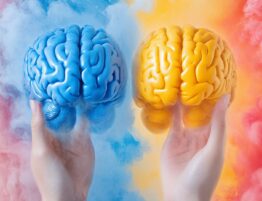The human body is a complex system. Each organ plays a vital role in maintaining health and sustaining life. The endocrine system influences and regulates the production of hormones. It helps the brain process information and store long-term and short-term memory. When hormonal imbalances occur, they can cause various health challenges. Hormones can be disrupted by aging, stress, illness, and lifestyle factors. Their impact is exceptionally influential on cognitive function and brain health in general.
Hormonal balance supports overall health, but its disruption causes many disadvantages. There are several essential hormones in our body, such as estrogen. Testosterone, cortisol, and thyroid hormones, along with others, have a significant impact. They affect brain function and cognitive abilities. Regular checkups with a doctor will help you maintain your psychological state and health. Together with physical activity and diet, it is possible to maintain health. People can sustain long-term improvements in memory and cognitive abilities. When hormonal imbalances are detected, prompt action should be taken to address them.
The Role of the Endocrine System in Mental Health
The endocrine system is the glands that produce hormones. The hormones regulate various physiological processes necessary for human life. They respond to mood, cognition, and overall brain function and performance. Hormones are essential for the body’s chemical processes and overall health. They affect everything, including mood and ensuring a high quality of life. Here are the key hormones and their functions:
- Cortisol. Cortisol is the most important hormone that affects mental health. It plays a key role in coping with and reducing stress. Cortisol is vital for overcoming depression and anxiety. It is essential for survival and key to human health. Its disorders lead to neuronal damage and memory impairment in humans. Often, a person with a disrupted hormone may be at increased risk of anxiety. Excessive levels of cortisol are associated with impaired brain function.
- Thyroid hormones. Thyroid hormones include T3 and T4, which play a role in brain metabolism. An imbalance of these hormones, which means hypothyroidism or hyperthyroidism, leads to constant fatigue, anxiety, and depression. These hormones are essential for mental health to avoid anxiety and restlessness. Their imbalance disrupts functions in the body, affecting a person’s mood and overall health.
- Estrogen. Estrogen is a sex hormone, just like progesterone. They are associated with the reproductive health of the human body. Estrogen affects cognitive function and mood regulation. Low levels are associated with memory impairment and an increased risk of Alzheimer’s disease.
How Imbalances in Hormones Lead to Neurological Disorders
Hormone imbalance has a profound impact on the onset of neurological disorders. The imbalance can accompany the onset of depression, stress, and deterioration of brain function. Hormonal imbalances can trigger and worsen neurological problems and cause serious illnesses. They strongly affect a person’s emotional state and memory. Fluctuations in hormones are caused by disturbances and malfunctions in the human body. Hormonal imbalance has a profound impact on brain function. Hormone imbalances can lead to:
- Stress. Hormone imbalances have a profound impact on neurological disorders and cause increased stress. Chronic stress leads to high cortisol levels, which damage neurons in the brain, especially in the hippocampus. This can lead to learning difficulties and memory problems. The process is associated with anxiety and depression and disrupts the neuroplasticity of the brain.
- Menopause. Menopause can be another serious problem. Estrogen helps to maintain cognitive function during its decline, and memory lapses become noticeable. This is especially true for menopausal women who are at an increased risk of Alzheimer’s disease. Menopausal women are at a higher risk of depression and mood disorders.
- Thyroid imbalance. Hormonal balance supports thyroid function. An imbalance in hormones causes hypothyroidism, low hormone levels, and slower brain function. A person loses concentration and has serious memory problems. The imbalance also causes hyperthyroidism, which is an excess of thyroid hormones. During this process, a person experiences difficulty concentrating and anxiety.
Common neurological disorders can significantly impact a person’s health. Alzheimer’s disease is associated with an imbalance of estrogen and insulin. Depression occurs as a result of thyroid dysfunction. Anxiety disorders are caused by high cortisol levels and thyroid imbalance. Neurological disorders include Parkinson’s disease. It is associated with dopamine and imbalances in testosterone and estrogen.
Cognitive Enhancement Through Hormonal Regulation
LoneStarNeurology offers highly qualified care for people with neurological problems. Treatment and maintenance of a balanced hormonal state will help maintain health. Support is beneficial for optimal brain function, memory, and cognitive abilities. Important hormones in the human body play a key role in cognitive health. They affect cognitive enhancement and emotional stability. Here are the main ways hormones affect cognitive health:
- Lifestyle changes. Regular physical activity is beneficial for brain health and overall health. Strength training helps to maintain testosterone and estrogen levels. Learn stress management techniques to improve your condition and peace of mind. Meditation, yoga, and deep breathing are helpful exercises. Sleeping in a cool room can improve sleep quality and brain health.
- Nutrition and diet. Always eat healthy foods filled with omega-3 fatty acids to reduce brain inflammation. Proteins are helpful for the production of dopamine and serotonin, including foods rich in antioxidants, such as dark chocolate, greens, and berries. For cognitive enhancement, eat less sugar and low-glycemic foods.
- Medical procedures. Medical treatments and supplements play an important role in maintaining health. Special therapies can help prevent cognitive decline and improve health. Supplements including B vitamins and vitamin D will improve your overall condition. They affect mood and the production of neurotransmitters in the brain.
Hormones and Mental Health: The Science Behind It
Hormones are directly related to mental health and its maintenance. Different hormones influence stress levels, depression, and anxiety. Understanding how hormones fluctuate and affect brain function is essential. Here are its main characteristics and effects:
- Serotonin. Serotonin affects mood, and its decrease causes depression and anxiety. An imbalance contributes to panic disorders and leads to negative mood states. Physical activity, sunlight, and healthy foods increase serotonin levels.
- Cortisol. Cortisol is considered a stress hormone, and its high levels cause depression and anxiety. Excess impairs memory and leads to mental fatigue. Meditation, physical activity, and breathing will regulate cortisol.
- Progesterone. Mental health is affected by progesterone, and its low level leads to irritability and insomnia. A balanced diet, stress management, and therapy support progesterone balance.
Research shows interesting connections between hormones and health, including their effects on hippocampal function. Progesterone and estrogen decline affects the onset of Alzheimer’s disease. Postmenopausal women experience memory loss. Increasing serotonin levels can improve mental health.
Cognitive function and medical treatment are closely interconnected. Lifestyle adjustments such as exercise and nutrition play an essential role. Medical intervention is necessary for people with severe imbalances. Regular meditation helps to find balance, calmness and health.
Managing Hormonal Balance to Prevent Cognitive Decline
Hormonal balance is essential for maintaining brain health and cognitive performance. Fluctuations in important hormones can cause stress on the body and lead to serious problems. Here are practical approaches to maintain this balance:
- Stress management. Mindfulness and meditation are the best methods for reducing stress and improving hormonal regulation. Don’t forget to get a good night’s sleep of about 8-9 hours for brain health. Practice positive thinking and focus on uplifting moments in your life.
- Exercise. Physical activity is ideal for improving overall brain and body health. Strength training will increase testosterone and growth hormone levels. Aerobic exercise will help support brain function and regulate cortisol.
- Diet. Hormonal balance is maintained by a good diet rich in vitamins. Eat healthy fats and protein-rich foods. Limit sugar and processed foods for your health.
Hormone replacement therapy can help protect cognitive health. Estrogen and progesterone helps menopausal women reduce cognitive decline. Testosterone therapy supports memory and brain function in older men. For people with hypothyroidism, thyroid hormone therapy is essential. To avoid neurological disorders, take special medications prescribed by your doctor. Do not forget about valuable vitamins for hormone production and brain function.
Hormonal Therapy for Neurological Health: Pros and Cons
Hormonal therapy includes many methods to restore the balance of hormones. It affects neurological health and has many benefits. However, its risks should be discussed directly with your doctor. Here are the main characteristics of the benefits and risks of hormone therapy:
Hormone replacement therapy (HRT)
Benefits:
- It helps to avoid neurological disorders and reduces the risk of osteoporosis in postmenopausal women.
- It is an excellent method to prevent memory loss and cognitive decline.
- It supports mood regulation and reduces anxiety and depression.
Risks:
- Increases the risk of blood clots, stroke, and certain types of cancer.
- It is not suitable for women with a history of hormone-related cancers.
Therapy with thyroid hormones
Advantages:
- Essential for people with hypothyroidism to prevent cognitive impairment.
- It improves mood, energy levels, and mental clarity.
Risks:
- It can lead to anxiety, heart palpitations, and mental health problems.
- Improper dosage will cause fatigue and mood instability.
To maintain hormonal balance, it is important to take care of your health. Before hormone therapy, you should consult a medical professional. They can discuss all the risks and benefits with you and monitor your hormone levels.













Please, leave your review
Write a comment: